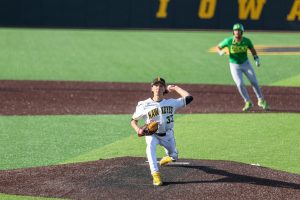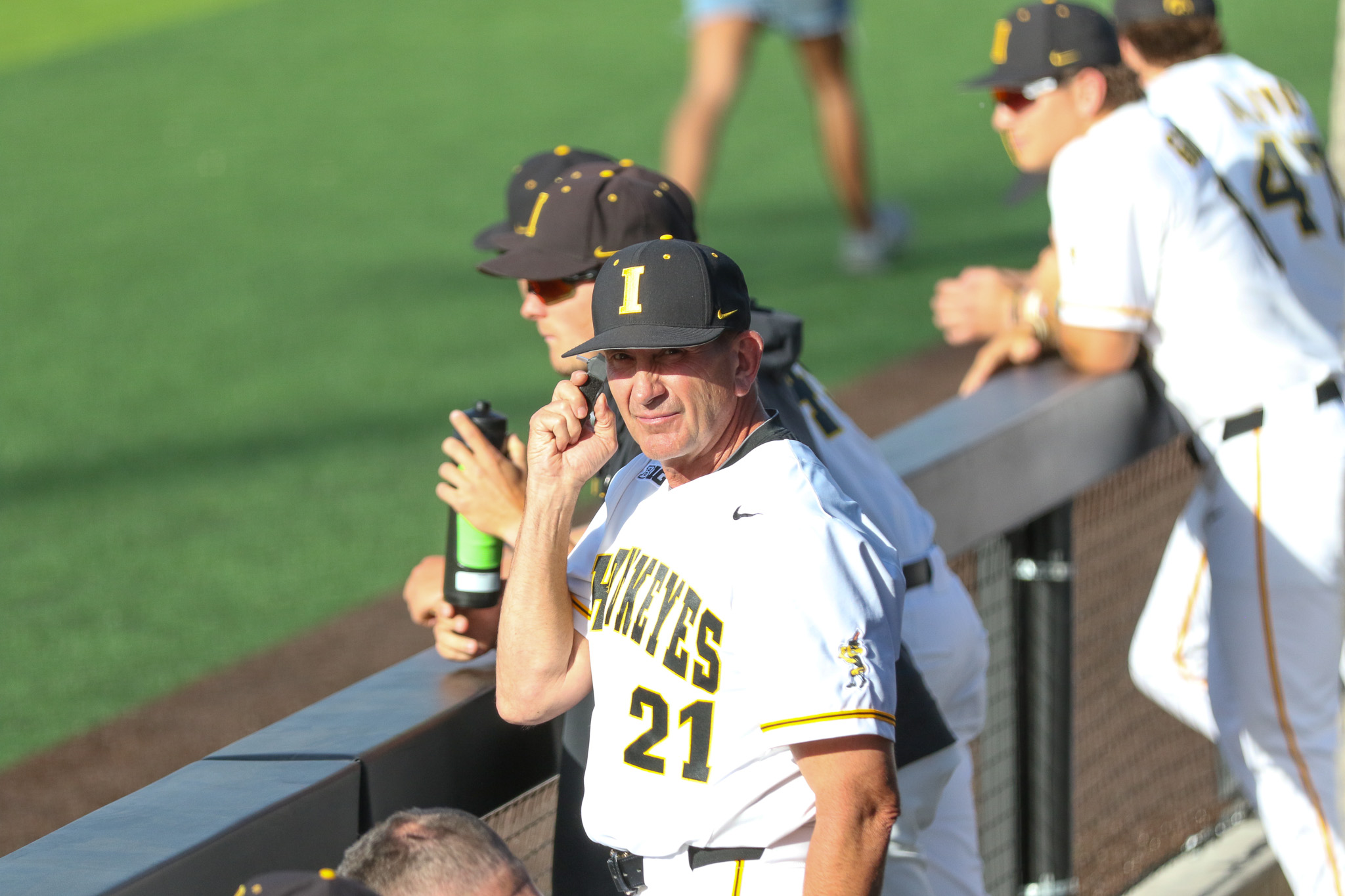Iowa baseball’s 21-9 Big Ten record overshadowed by late-season collapse
By Pat Harty
IOWA CITY, Iowa – No Iowa baseball team should ever have to apologize or try to justify finishing 21-9 in conference play.
The latter part of Iowa’s season certainly didn’t go well as the Hawkeyes finished just 2-10-1 in their final 13 games, falling from first place in the conference standings to third.
But to even have been in first place for most of the season was a worthy accomplishment under the circumstances.
Some fans might not want to hear that right now with Iowa having played so poorly down the stretch, including Saturday’s 9-3 loss to UCLA in the Big Ten Tournament semifinals in Omaha, Nebraska.
Third-place doesn’t seem so bad, though, considering Baseball America picked Iowa to finish ninth in the 17-team Big Ten standings.
The Hawkeyes led the conference standings until the final week of Big Ten play, and at one point were 20-4 in the conference.
Iowa also led the Big Ten in hitting and pitching for most of the season, and had two pitchers – Cade Obermueller and Aaron Savary – both make first-team All-Big Ten, which is a testimony to Sean Kenny’s impact in his first year as Iowa’s pitching coach.
There was so much to like about this season from Iowa’s standpoint. But that still doesn’t change or minimize what happened down the stretch against the toughest part of the schedule.
The addition of four Pacific-12 schools was expected to make the challenge in baseball far more difficult, and that has certainly been the case, especially with Iowa, which finished a combined 1-6 this season against former Pac-12 teams Washington, Oregon and UCLA.
Iowa also finished 0-2-1 against former Pac-12 member Oregon State, which now competes as an independent. That series was played at Principal Park in Des Moines and was played a week after the Washington series and a week before the Oregon series.

Following Saturday’s loss to UCLA, Iowa head coach Rick Heller’s called his team’s late season collapse unacceptable.
Heller also told the media that covered Saturday’s loss in Omaha that he feels as if Iowa’s 2-10-1 finish sort of came out of nowhere because he saw no signs of things going off track in practice, or in the clubhouse.
Apparently, the only sign of trouble was Iowa’s schedule, which saved its best for last.
Iowa was in first place and controlled its own destiny heading into the final series of the regular season against Oregon.
The three games were played in Iowa City, and before record-breaking crowds, and yet, Oregon still swept the series by a combined score of 32-10.
You name it and the Ducks had the advantage over Iowa, including hitting, pitching, defense and base running.
Oregon hit with power and also showed the ability to manufacture runs by playing small ball with timely precision.
Oregon also has other advantages over Iowa in baseball, namely more NIL resources and a better recruiting base.
And while the Ducks fell short of winning the Big Ten Tournament, they’re still built to make a deep run in the NCAA Tournament, whereas a case could be made for Iowa being the best of the traditional Big Ten teams in baseball this season, even with Nebraska advancing to the championship game of Big Ten Tournament on Sunday.
Heller faces the daunting task of trying to narrow the gap with deep-pocketed opponents such as Oregon.
Iowa’s NIL setup for baseball leaves so much to be desired, partly because there isn’t anyone leading the cause, besides maybe Heller, who already has enough to do.
Heller deserves credit for addressing Iowa’s pitching woes from the 2024 season, which was mostly allowing too many free bases.

He hired Sean Kenny as the new pitching coach, and to say that Kenny has made a positive impact would be an understatement.
Under Kenny, Iowa Iowa’s national rankings have improved in multiple categories; from 123rd to 15th in ERA, from 134th to 19th in WHIP and from 147th to 43rd in K-to-BB Ratio.
The Iowa pitching staff entered Saturday’s game against UCLA ranked second in the nation with nine shutouts, fourth in hits allowed per nine innings (7.09), 11th in strikeouts per nine innings (10.9) and has the 15th best ERA in the NCAA (4.06).
Iowa’s weekend rotation of Obermueller, Savary and Reece Beuter combined to go 17-3 with a 3.10 ERA. They had struck out 244 batters heading into Saturday’s game and walked 79 over 38 starts and 203 innings pitched. All three pitchers were ranked in the top five in the Big Ten in ERA and top six in opponent batting average.
Beuter also was ranked third in the nation and he led the Big Ten in left on base percentage (88.1%). He also led the conference with a .227 batting average on balls in play.
On one hand, the Iowa baseball team exceeded expectations this season by winning eight straight Big Ten series and 21 conference games overall.
But on the other hand, Iowa couldn’t compete with the big boys from the West Coast, and that’s a problem that has to be addressed moving forward.
Heller has made winning at least 30 games in a season seem almost routine now. The program has sustained a certain level of success under Heller that is significant a step up compared to when he took over in 2014.
Iowa has made the NCAA Tournament three times under Heller, most recently in 2023.
Prior to Heller’s arrival, Iowa had only made the NCAA Tournament once since 1976, and that came in 1990.
That doesn’t make the way this season finished any easier to accept, but it should help to put things in perspective.
Iowa baseball has come a long way under Rick Heller, but as the stretch drive showed, still has a ways to go.


